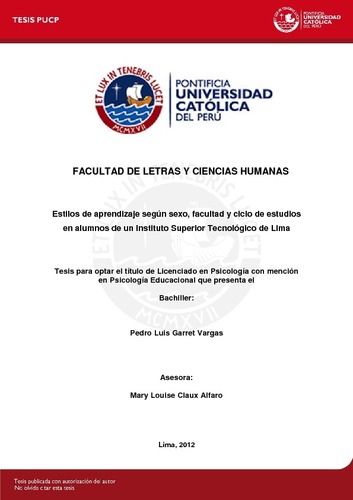| dc.contributor.advisor | Claux Alfaro, Mary Louise | es_ES |
| dc.contributor.author | Garret Vargas, Pedro Luis | es_ES |
| dc.date.accessioned | 2013-01-28T21:32:28Z | es_ES |
| dc.date.available | 2013-01-28T21:32:28Z | es_ES |
| dc.date.created | 2012 | es_ES |
| dc.date.issued | 2013-01-28 | es_ES |
| dc.identifier.uri | http://hdl.handle.net/20.500.12404/1699 | |
| dc.description.abstract | La mayoría de investigaciones existentes sobre estilos de aprendizaje utiliza
comúnmente análisis univariantes, por lo que aún no hay consenso acerca del efecto
de diversos factores asociados a dicho constructo. En esta línea, tomando como base
la Teoría del Aprendizaje Experiencial propuesta por David Kolb, el propósito de este
estudio fue comprobar la existencia de diferencias en los estados básicos del ciclo de
aprendizaje y en los estilos de aprendizaje de acuerdo a la interacción entre las
variables de sexo, facultad y ciclo de estudios en un grupo de alumnos de un Instituto
Superior Tecnológico de Lima. Para ello, se aplicó el Inventario de Estilos de
Aprendizaje (IEA) – Versión 2 a 370 estudiantes matriculados en el semestre
académico 2011-1. Al realizar el análisis multivariante de varianza (MANOVA) se
encontró que los estilos de aprendizaje no variaron en función al cruce de las variables
de estudio. Se comprobó que solo la variable facultad de pertenencia produjo un
efecto significativo en las diferencias de los estilos de aprendizaje de los estudiantes,
incluso en todas las escalas del instrumento administrado. Asimismo, aunque de una
manera menos intensa, la variable de sexo también ejerció un efecto relevante en
algunas dimensiones, pues los varones prefirieron la conceptualización abstracta y las
mujeres la experiencia concreta. Sin embargo, la variable ciclo de estudios no mostró
ningún efecto. | es_ES |
| dc.description.abstract | Most existing research on learning styles commonly use univariate analysis, so there is
no consensus about the effect of multiple factors associated with this construct. In this
context, based on Experiential Learning Theory proposed by David Kolb, the purpose
of this study was to verify the existence of differences in the four stages of the learning
cycle and learning styles according to the interaction between sex, faculty and course
of study in a group of students from a Technology Institute of Lima. To do this, the
Learning Styles Inventory (LSI) – Version 2 was applied to 370 students enrolled in the
2011-1 academic semester. When performing multivariate analysis of variance
(MANOVA), it was found that learning styles did not differ according to the crossing of
the research variables. It was found that only the faculty variable produced a significant
effect on the differences in students’ learning styles, even in all scales of the instrument
administered. Although in less intensity, the sex variable also had a significant effect on
some dimensions, because men preferred abstract conceptualization and women
preferred concrete experience. However, the course of study variable showed no
effect. | es_ES |
| dc.language.iso | spa | es_ES |
| dc.publisher | Pontificia Universidad Católica del Perú | es_ES |
| dc.rights | Atribución-NoComercial-SinDerivadas 2.5 Perú | * |
| dc.rights | info:eu-repo/semantics/openAccess | es_ES |
| dc.rights.uri | http://creativecommons.org/licenses/by-nc-nd/2.5/pe/ | * |
| dc.subject | Aprendizaje (Educación) | es_ES |
| dc.subject | Educación superior--Perú | es_ES |
| dc.title | Estilos de aprendizaje según sexo, facultad y ciclo de estudios en alumnos de un Instituto Superior Tecnológico de Lima | es_ES |
| dc.type | info:eu-repo/semantics/bachelorThesis | es_ES |
| thesis.degree.name | Licenciado en Psicología Educacional | es_ES |
| thesis.degree.level | Título Profesional | es_ES |
| thesis.degree.grantor | Pontificia Universidad Católica del Perú. Facultad de Letras y Ciencias Humanas | es_ES |
| thesis.degree.discipline | Psicología Educacional | es_ES |
| renati.discipline | 313046 | es_ES |
| renati.level | https://purl.org/pe-repo/renati/level#tituloProfesional | es_ES |
| renati.type | http://purl.org/pe-repo/renati/type#tesis | es_ES |
| dc.publisher.country | PE | es_ES |
| dc.subject.ocde | http://purl.org/pe-repo/ocde/ford#5.01.00 | es_ES |






